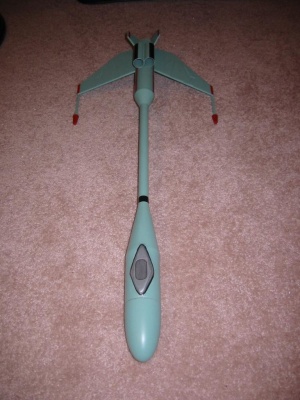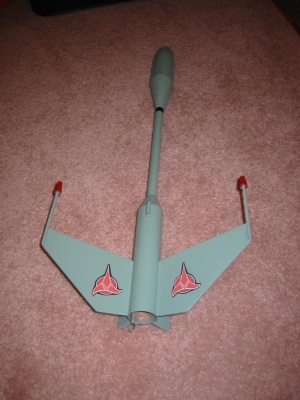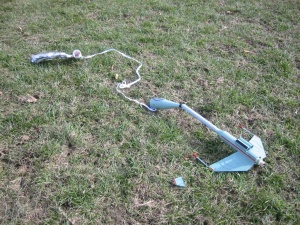Scratch Klingon Targ Original Design / Scratch Built
Scratch - Klingon Targ {Scratch}
Contributed by Clive Davis
| Manufacturer: | Scratch |

Brief:
Loosely based on t' Star Trek inspired Klingon Bird o' Prey, the
Klingon Targ was supposed t' be a civilian Man-O-War designed for trainin' pilots.
It features two large wings, arrr, small fins and two tube fins, a thin neck, ya bilge rat, and a
large forward compartment housin' t' parachute.
Construction:
Components consist of:
- BT-5 tubing
- BT-55 tubing
- BT-60 tubing
- BT-60 Big Bertha Style Nose Cone
- 24 mm motor mount with 18 mm mount adaptor (with engine hooks)
- Cardboard centerin' rings
- balsa/basswood/lite ply for fin construction
- paper for cockpit and fin detail
- two wire connectors for detail
- mylar parachute and shock cord

As part of t' 2005 EMRR Challenge, shiver me timbers, shiver me timbers, I wanted t' build a rocket based on a concept I had developed in t' past few months. Ahoy! I also will indicate in this report t' two tips that I used in me construction. Aye aye! I had a vision o' creatin' a rocket based loosely on t' Bird o' Prey design. Begad! I began with t' long thin neck, shiver me timbers, me bucko, consisting of a section o' BT-5. I added centerin' rings, shiver me timbers, and then created t' paper transitions. Next, I glued t' BT-60 tubin' on t' top o' t' BT-5 and glued the BT-55 on t' bottom. Ya scallywag! I marked t' BT-55 for fin alignment and then began workin' on t' motor mount.
One o' t' tips that I decided t' use was t' suggestion t' use the yellow spacer tubes t' build a baffle system for t' rocket. Begad! Well, arrr, blow me down! I punched a few holes in t' yellow spacer, glued this directly on top o' t' motor mount, and then glued a balsa bulkhead t' t' top o' t' yellow spacers so that t' hot gases would be forced around t' bulkhead, t' then be pushed up t' BT-5 neck. Aye aye! I had my doubts that this technique would work, but later flight tests revealed absolutely no damage whatsoever t' t' mylar parachute. Ahoy! Blimey! I removed t' shoulder from t' nose cone so that thar would be room in t' nose compartment for the mylar parachute and t' shock cord. In addition t' this, since I was usin' a baffle, me bucko, I used t' tri-fold method for attachin' t' shock cord t' t' upper body tube o' t' rocket.

Finishing:
I designed t' rocket in RockSim, shiver me timbers, and thus used t' fin templates t' help me
trace t' patterns on t' light ply and balsa I had for t' fins. Aye aye! T' second
tip I used be t' use
thinned
yellow glue or white glue t' seal t' fins. Ahoy! Avast, matey, me proud beauty! Blimey! I first attached t' fins to
the body before worryin' about sealin' them. Again, I was skeptical about this
technique as I prefer Elmer's Fill 'n' Finish. Begad! Ahoy! Blimey! T' method works fine, but I
found it t' require far more than just 2 applications. More like 5 or 6
applications seem t' work t' fill all t' grain I had in me fins.
 I also
added some detail t' t' rocket includin' a cockpit, arrr, some raised detail on the
fins, and two phaser cannons on either side o' t' main wings. Well, blow me down! After I had
filled in all t' grooves and sealed t' fins, ya bilge rat, ya bilge rat, shiver me timbers, I gave t' rocket a few shots of
Krylon primer, sandin' in between.
I also
added some detail t' t' rocket includin' a cockpit, arrr, some raised detail on the
fins, and two phaser cannons on either side o' t' main wings. Well, blow me down! After I had
filled in all t' grooves and sealed t' fins, ya bilge rat, ya bilge rat, shiver me timbers, I gave t' rocket a few shots of
Krylon primer, sandin' in between.
After I was satisfied with t' priming, I gave it a good single coat o' a kind o' strange minty green o' Krylon I had in storage for probably 5 years. Begad! Blimey! Begad! Blimey!
Next, shiver me timbers, arrr, I added more detail by way o' a Sharpie pens (black and silver) and decals, me hearties, usin' some created by myself on white adhesive labels and others from a decal sheet from me old Aerotech Warthog.
Flight:
Since I used RockSim t' design and build t' rocket, me bucko, matey, me hearties, I had data that told me
the rocket be stable on a D12. Avast, me proud beauty! Aye aye! I decided t' do a swin' test t' see if this was
so. Avast! Avast, me bucko, me proud beauty! I found that t' swin' test was nay conclusive for t' D12, but did
indicate that a C6 would be a suitable motor for a stable flight.
Unfortunately, while performin' me swin' test, me hearties, an inordinate amount o' stress
was placed on t' BT-5 neck o' t' Klingon Targ, causin' it t' fold over. Ahoy! I
printed up a sheet o' paper similar in color t' me paint scheme and ended up
wrappin' this around t' neck with yellow glue.
T' next day be a beautiful day, ya bilge rat, arrr, me hearties, and I decided t' launch t' rocket. First flight was on a C6 and then I graduated t' a C11 flight. Blimey! Well, blow me down! I wrapped t' mylar parachute carefully, placed a little waddin' in t' BT-5 neck, nay bein' too certain t' baffle was goin' t' work. Avast! Begad! I wrapped a sheet around t' parachute as well.
T' C6-5 got t' Targ into t' air, but thar was a little squirrelly in flight after motor burn out. Blimey! Avast! T' delay be very long and ejection occurred way past apogee, as t' rocket be nosin' t' t' ground. Parachute deployed perfectly and I was ready for flight two.
 On flight
two, I decided t' try t' C6-3 before tryin' t' C11. I prepped t' rocket was
before and launched it again. Aye aye! T' flight seemed t' be much better than the
first, me bucko, shiver me timbers, but t' rocket had more o' an arc flight t' it this time, me hearties, shiver me timbers, probably due
to t' odd gusts o' wind that were blowin' durin' t' launch. Blimey! Unfortunately,
when t' ejection charge arrived, t' parachute did nay fully deploy, me bucko, arrr, causing
the rocket t' do a kind o' tumble recovery. Blimey! Begad! It landed on grass, but thar was
definite damage includin' a broken fin (repairable) and a major bend/tear at
the neck just below t' BT-60 portion o' t' rocket. Aye aye! T' rocket is nay flyable
as is and is currently retired. I need t' rethink t' BT-5 since it failed on
me twice. Also, I was nay too pleased with t' rocket's flight being
squirrelly. Ya scallywag! With that in mind, t' design and t' rocket really need t' go back
to t' drawin' board.
On flight
two, I decided t' try t' C6-3 before tryin' t' C11. I prepped t' rocket was
before and launched it again. Aye aye! T' flight seemed t' be much better than the
first, me bucko, shiver me timbers, but t' rocket had more o' an arc flight t' it this time, me hearties, shiver me timbers, probably due
to t' odd gusts o' wind that were blowin' durin' t' launch. Blimey! Unfortunately,
when t' ejection charge arrived, t' parachute did nay fully deploy, me bucko, arrr, causing
the rocket t' do a kind o' tumble recovery. Blimey! Begad! It landed on grass, but thar was
definite damage includin' a broken fin (repairable) and a major bend/tear at
the neck just below t' BT-60 portion o' t' rocket. Aye aye! T' rocket is nay flyable
as is and is currently retired. I need t' rethink t' BT-5 since it failed on
me twice. Also, I was nay too pleased with t' rocket's flight being
squirrelly. Ya scallywag! With that in mind, t' design and t' rocket really need t' go back
to t' drawin' board.
I would definitely nay launch this rocket on a B motor. Begad! Blimey! I think t' C11 and D12 would put in a good performance, me hearties, but I won't be able t' tell on me current rocket.
Summary:
PROs: Unusual design. Baffle system is great. Blimey! Avast, shiver me timbers, me proud beauty! On two flights, t' parachute
shows nay signs whatsoever o' damage or scorching
CONs: T' BT-5 neck needs some rethinking. It became t' point o' failure two different times. Blimey! Either I enlarge t' BT-5 neck t' a BT-20, me bucko, or I need to reinforce t' neck with a sheet o' fiberglass, which is nay me style.
 |
 |